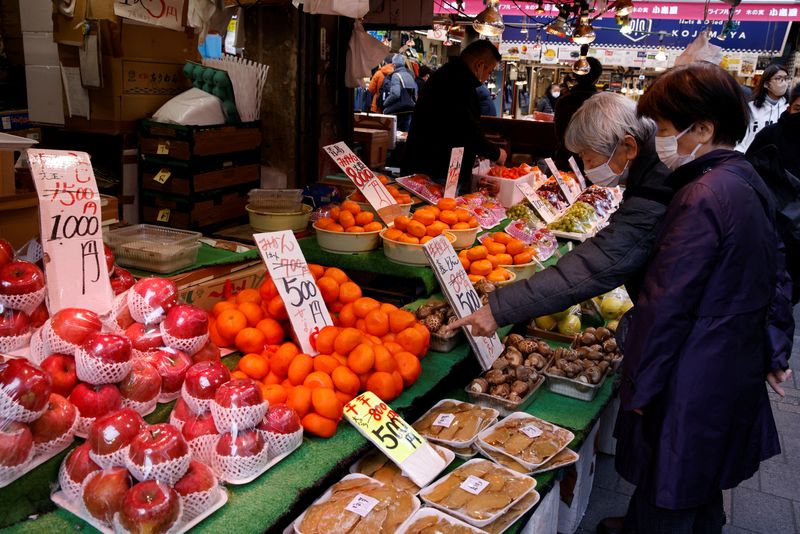Asia stocks slip as looming tariff deadline eclipses trade progress
By Tetsushi Kajimoto
TOKYO (Reuters) -Japan's core consumer prices slowed in July, supporting expectations the Bank of Japan (BOJ) will be in no rush to phase out monetary easing, even as inflation remains stubbornly above the central bank's target.
The 3.1% rise in the core consumer price index (CPI), which includes oil products but excludes volatile fresh food prices, matched a median market forecast, following a 3.3% increase the previous month. It held above the BOJ's 2% inflation target for the 16th straight month.
The so-called core-core inflation index, which excludes fresh food and energy prices and is closely watched by the BOJ as a better gauge of trend inflation, rose 4.3% year-on-year in July, accelerating from the previous month.
The central bank argues that wage pressures have yet to build up enough to warrant a fresh tweak to the ultra-loose monetary stance.
Still, analysts say an acceleration in service-led inflation is a positive sign that demand-side inflation, which the BOJ is looking to stoke, may be building.
"The data confirmed that price pressures are rising in the service-sector such as accommodation as well as food, while import inflation including energy is calming down," said Takeshi Minami, chief economist at Norinchukin Research Institute.
Gabriel Ng, economist at Capital Economics, said the key question is whether services inflation can pick up the baton.
"With unit labour costs barely rising and consumer spending starting to falter as real incomes are falling sharply, we doubt that it will," said Ng.
"Accordingly, we still expect the Bank of Japan to keep its short-term policy rate unchanged for the foreseeable future."
Food costs were among the major contributors to overall inflation due to elevated prices of raw materials.
The data comes after the BOJ's closely watched policy meeting late last month in which the central bank tweaked monetary policy to allow the 10-year bond yield cap to move more flexibly.
A Reuters poll of 16 analysts expected data due next Friday to show the Tokyo-area core consumer prices likely rose 2.9% year-on-year in August, slowing from the prior month's 3%, with some bracing for inflation to slow below 2% in fiscal 2024.

BOJ Governor Kazuo Ueda has stressed the need to keep policy ultra-loose until cost-push inflation shifts into one driven by robust domestic demand and higher wage growth.
Under the BOJ's yield curve control, the central bank guides short-term interest rates at -0.1% and buys huge amounts of government bonds to cap the 10-year bond yield around 0% as part of efforts to fire up inflation to its 2% target.
Which stock should you buy in your very next trade?
AI computing powers are changing the stock market. Investing.com's ProPicks AI includes 6 winning stock portfolios chosen by our advanced AI. In 2024 alone, ProPicks AI identified 2 stocks that surged over 150%, 4 additional stocks that leaped over 30%, and 3 more that climbed over 25%. Which stock will be the next to soar?
Unlock ProPicks AI